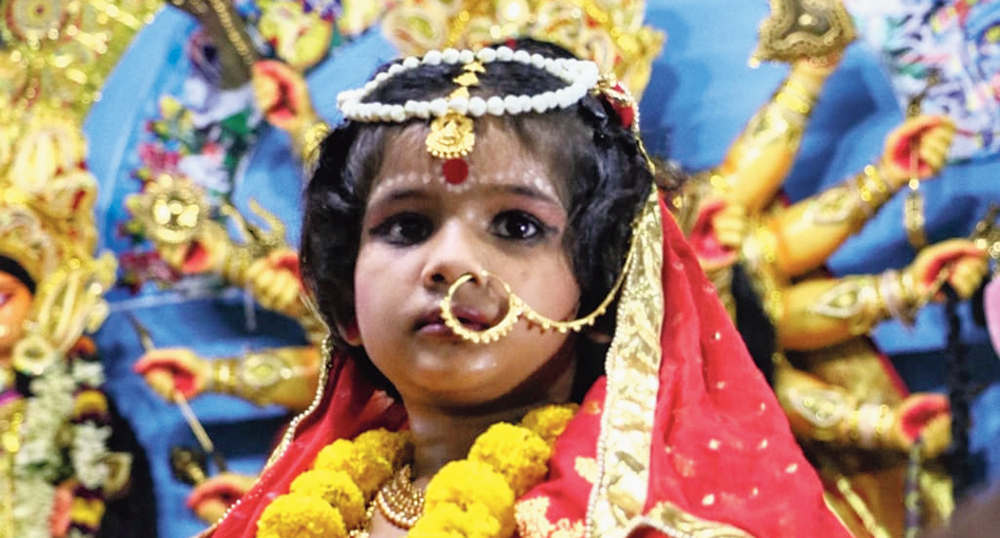Little Alia Parvin was one of five little girls decked up identically in red sari, bindi, tiara and floral garland. She had come from a neighbourhood slum, accompanied by her mother Zeenat Begum and eight-year-old brother. She was to be worshiped as a deity on Ashtami at the kumari puja of Bidhannagar Ramakrishna Vivekananda Kendra in DD Block. It did not matter that Alia was not Hindu.
The next day, on Navami, Swastika Gayan, an eight-year-old chosen to be worshiped as kumari in BD Block, reached the venue by auto-rickshaw, driven by her father Kartik. The proud father had taken a break from his usual routine of driving his auto on the Karunamoyee-Ultadanga route for the ritual. It did not matter that Swastika was not a Brahmin.
If the above cases are any indication, the township seems to be looking beyond caste and creed and embracing differences while celebrating our greatest festival.
Five-year-old Alia was worshiped with four other girls from her school. “Every year parents come and request us to worship their daughters but this year nothing had been finalised. So we decided to choose students of the school run by our institute. Alia is one of them,” said Bidhannagar Ramakrishna Vivekananda Kendra president, Chanchal De.
He referred to Swami Vivekananda worshipping the daughter of a Muslim boatman as kumari in Kashmir in August 1898. “Thereafter we haven’t heard of any such instance. So we thought of doing it,” he said.
Alia’s family hails from Bihar and her mother admitted that she didn’t know what the puja entailed. “I just trusted her school teachers. They dressed her up and told her what to do,” she said.
Devotees who watched the puja were happy. “Who are we to find differences when Ramakrishna himself had said that there is no difference between jol, pani and water, implying the ultimate reality is the same? Sarada Ma had said Amjad and Sarat were both her sons,” said Sikha De of BA Block.

Alia Parvin as kumari (The Telegraph)
Madhumita Chakraborty, a resident of CD Block and acting principal of the Kendra’s school, said the worship of a Muslim child was a message they wanted to send across. “It’s necessary, given the times we live in. We wanted to make it clear that Durga puja is not a celebration exclusive to any religion. It is a combined festival of everyone in Bengal,” she said.
Swastika’s name was suggested as kumari by one of her teachers at Ananda Tirtha in AC Block. The teacher, Arpita Das, is also the joint secretary of the puja committee of BD Block where the girl too stays.
“Everyone agreed to my proposal. We wanted to send out the message that in the 21st century there can be no differentiating between Brahmin and other castes,” she said.
During the puja, the girl sat composed, holding a lotus, blessing devotees, obliging shutterbugs and stealing glances at the gifts she was receiving. “I’ve got clothes, a doll, bag, pencil box and a teddy bear that I’ll give to my sister,” she told The Telegraph Salt Lake later.
Her sister Oishika was held by father Kartik while mother Puja helped Swastika with the rituals. “God is in every child,” said Kartik. The auto driver’s family lives in the garage of a BD Block house as caretakers. “We are happy to see our daughter being loved by everyone and it’s very nice of the organisers to treat us as equals.”
BD Block started conducting kumari puja last year and convenor Sucharita Nandi said that many more people had come to watch it this time. Pandal-hoppers like Anjana Basu of Birati were impressed to learn about the kumari. “This is a tribute to all auto and toto drivers, without whom our lives would be paralysed,” she said.
The priest Tapan Bhattacharya was progressive too. “A kumari has no caste or creed. Any girl qualifies, just like the bhiksha ma does at a sacred thread (poite) ceremony,” he said.










